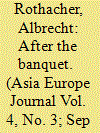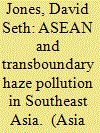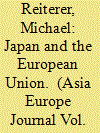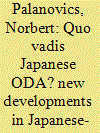|
|
|
Sort Order |
|
|
|
Items / Page
|
|
|
|
|
|
|
| Srl | Item |
| 1 |
ID:
073601


|
|
|
|
|
| Publication |
2006.
|
| Summary/Abstract |
The demise of Japan’s iron triangle, consisting of the LDP’s parliamentary party, the central ministries and the keiretsu conglomerates ruling Japan conjointly, has been diagnosed since some time now (Thayer, 1993; Blechinger, 2001). After more than one decade of an unprecedented crisis in Japan’s political economy which severely tested the competences and the legitimacy of Japan’s ruling classes it is about time to resume and to take stock of changes and continuities in her power structures. In a nutshell it appears that (1) the political system after serious shifts and jolts during the 1990s has reverted to the old one-and-a-half party system—with the conservative democrats (DPJ) displacing the Socialists of old as the main opposition party-and with the LDP remaining firmly in the lead role, exercising increased zoku control over the ministries and continuing hereditary pork barrel oriented constituency politics as its power base. The role of the party’s factions appears as somewhat diminished. (2) the central bureaucracy suffered a gradual erosion of functions and legitimacy, affecting notably the lead ministries MOF, MITI (METI) and MFA. This was however compensated in part by the large discretionary spending volumes disbursed by the merged Infrastructure Ministry (MLIT), the supervisory functions of the new Financial Services Agency (FSA), and the strengthened competences of the Prime Minister’s Office (PMO). (3) the prolonged economic crisis and asset deflation affecting city banks as keiretsu lead managers consequent to a series of bank mergers has seen some keiretsu disintegrate or amalgamate. Yet it appears that other keiretsu, like Sumitomo (having taken over Mitsui) and Mitsubishi remain consolidated, while some of the previously less integrated banking keiretsu continue in a fairly oversized and loosely merged fashion. Thus the keiretsu system’s micro-economic importance may have eroded somewhat compared to their heydays in the 1980s. Still keiretsu affiliated companies continue to dominate organized zaikai business interests, like the merged Keidanren–Nikkeiren.
|
|
|
|
|
|
|
|
|
|
|
|
|
|
|
|
| 2 |
ID:
073602


|
|
|
|
|
| Publication |
2006.
|
| Summary/Abstract |
In recent decades the countries of Southeast Asia have been affected by air pollution (commonly called haze) arising from the burning of vegetation by small holders, plantation owners and logging companies. This is done in order to clear or rejuvenate the land for cultivation and planting and can occur at particular times during the year, most noticeably in the periods March to May and August to October. The burning has resulted in widespread forest fires and has been particularly intense in years when the weather has been noticeably dry due to the effects of the El Nino phenomenon. By far the main source of forest fires caused by small holders and plantation owners has been Indonesia. The smoke from the forest fires has not only caused widespread air pollution in Indonesia itself but also in neighbouring countries, resulting in what is termed as transboundary air pollution. This has affected, amongst other things, public health, bio-diversity, tourism, air transport, and agricultural production. So serious have the effects been that the member states of the Association of Southeast Asian Nations (ASEAN) were prompted from 1990 to collaborate in tackling the problem and to embark upon a series of joint initiatives for that purpose. After discussing the extent of forest burning in Indonesia, its causes and effects, the article will examine and assess the initiatives mentioned above, culminating in the ASEAN Agreement on Transboundary Haze Pollution, which came into effect in November 2003. The paper will then examine a crucial impediment to the effective implementation of the initiatives: viz. the standards of governance and administration in Indonesia. In conclusion, the paper will consider the challenges to be overcome to enable the aims of the ASEAN initiatives to be realised, and also, by examining these initiatives, what conditions are necessary to ensure that international agreements affecting domestic policy and administration in signatory states, have a genuine impact and achieve their goals.
|
|
|
|
|
|
|
|
|
|
|
|
|
|
|
|
| 3 |
ID:
073597


|
|
|
|
|
| Publication |
2006.
|
| Summary/Abstract |
Japan and the European Union (Reiterer (2004b) 2:33–42) are both interested in enhancing their international standing in order to overcome their perceived status as economic giants but political dwarfs. While the reasons for this endeavour as well as the inherent characteristics of the actors involved—a traditional nation state as compared to the most advanced integration structure world-wide—are quite different, both entities see themselves primarily as civilian powers (Whitman (2006) 11(1):1–15) without neglecting the need to endow themselves with a military capacity in order to be more effective and credible on a world-wide scale. The ‘EU is emerging as a key regional actor in certain global affairs, particularly in such areas as finance, trade, environment and development, and current policy is directed towards enhancing the role of the European Union in the global governance system. To this end, the European Commission is actively engaged in such issues as the global governance of trade, the protection of human rights, the promotion of democracy, strengthening of regional and global security communities, and encouraging regional integration in other parts of the world.’ (Farrel (2005) 10(4):452–453)—all areas, except the latter task, where the EU and Japan could potentially cooperate closely.
Objectives Before identifying shared foreign policy interests between the EU and Japan, I will first bring to light some of the interests the EU has in East Asia in general; secondly I will chart the major Japanese foreign policy interests which will allow me to map out areas of potential common interest and concern.
|
|
|
|
|
|
|
|
|
|
|
|
|
|
|
|
| 4 |
ID:
073598


|
|
|
|
|
| Publication |
2006.
|
| Summary/Abstract |
One of the most remarkable developments that took place in the postwar international order is the relationship between the United Kingdom and Japan, two major world powers. Formerly bitter enemies in war, their relationship is today perhaps at the best ever. They are connected by a network of shared interests in the politico-strategic, scientific-technological and socio-cultural spheres, beyond the economic realm. Nonetheless, as cooperation between Japan and Europe has been the fragile side of the triangle of “Japan–US–Europe” relations, the promotion of Japan–UK ties at bilateral, regional and international levels might have a significant effect. The trilateral structure of “Japan–Britain–EU” relations also creates diverse dynamics that involve all three forces in a broader regional cooperation including the security arena, than would be possible on just a bilateral Britain–Japan level. These impulses might help to facilitate Europe to become a more influential global actor and to serve as a key enabler of the British foreign policy toward the Asia-Pacific region. Under this context, this article strives to explore how Japan–UK bilateral relationship, one of the strongest ties binding Asia to Europe, stands today, by shedding light on the new horizons of their partnerships for global responsibilities.
|
|
|
|
|
|
|
|
|
|
|
|
|
|
|
|
| 5 |
ID:
073603


|
|
|
|
|
| Publication |
2006.
|
| Summary/Abstract |
Since its independence on the 17th of August 1945, Indonesia has been governed consecutively by five presidents. Among them, Retired Army Great General Soeharto managed to be president for more than 32 years. There were many factors making him succeed in reaching, promoting, as well as maintaining power for these years. Despite his ability to place the military forces and police, the civilian bureaucracy, the Functional Group called Golkar, as well as the conglomerates under his own tight control, he also managed to manipulate Javanese cultural values as the source of legitimacy for his decisions and policies. As a puritan Javanese, Soeharto believed that a number of traditional Javanese thoughts in the forms of guidance and prohibitions, when practiced, would not only make individuals but also the Indonesian people in general have a noble and generous mind, or ber budi bawa leksana, that is: the ones who are really good as the essence of goodness, or becik sajatining becik. He claimed that it would not be difficult for the Indonesian people to improve their consciousness as the nation of Indonesia in their state, government and social life on the basis of Pancasila, if they understood Javanese cultural values properly (Rukmana 1993:xi). Based on this belief, Soeharto then tried to convince people that his all decisions and policies were socially just and philosophically correct because they had been based on very high Javanese philosophical values. As for example, when he treated his enemy or rival, such as ex-President Soekarno, or when he responded the critiques launched by his rivals or enemies, like Sawito Kartowibowo, Jailani Naro, Soeryadi, Megawati Soekarnoputri, Abdurahman Wahid, Permadi, Sri Bintang Pamungkas, and Amien Rais, challenging his position as the President or asking questions about presidential succession, Soeharto knew how to manipulate Javanese cultural values in order to justify or even legitimize his decisions and policies.
|
|
|
|
|
|
|
|
|
|
|
|
|
|
|
|
| 6 |
ID:
073600


|
|
|
|
|
| Publication |
2006.
|
| Summary/Abstract |
Background In Japan, a steady increase of non-voters is evident on the national and local levels over the past few decades. However, since the mid-1990s, a new wave of political participation at the local level has attracted politicians as well as social scientists. Citizen participation is increasing in terms of the number of non-profit organizations, participatory procedures, and engagement in new political networks. Citizens growing involvement in local politics coincides with institutional changes that offer new autonomy in respect of local policy-making.
Objectives In this paper, we will argue that these local trends might have an impact on national politics through the repolitization of citizens. However, preconditions are, ceteris paribus, the restoration of political trust through participation and institutional changes that support citizen involvement in politics.
The authors have been engaged in a project on “Civil Society in Japan: Partnership as a New Item of Japan’s Local Politics” since 1 March 2006. The project is located at the Department for Japanese Studies at the Martin Luther University of Halle-Wittenberg (Germany) and financed by the German Research Foundation (Deutsche Forschungsgemeinschaft, DFG).
|
|
|
|
|
|
|
|
|
|
|
|
|
|
|
|
| 7 |
ID:
073599


|
|
|
|
|
| Publication |
2006.
|
| Summary/Abstract |
Japan positioned itself in a special situation among the aid donor countries. This paper presents the trends in Japanese Official Development Aid policies in the new Millennium, provides an overview and discussion of the characteristics of Japanese ODA, and examines the different views and critiques that have arisen regarding Japan’s development aid policies. The paper’s goal is to highlight and interpret the latest developments and reforms of Japan’s ODA administration and strategies, its strengths and weaknesses, and to understand how ODA is becoming a more strategic, a stronger political, diplomatic and foreign policy tool in the hands of the Japanese government.
|
|
|
|
|
|
|
|
|
|
|
|
|
|
|
|
| 8 |
ID:
073596


|
|
|
|
|
|
|
|